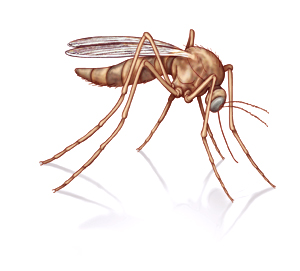West Nile virus (WNV) infects birds and some mammals throughout the U.S. Mosquitoes become infected when they bite a bird or mammal that carries the virus. People may become infected when they're bitten by a mosquito with the virus. Most WNV infections are very mild or cause no symptoms at all. Only 20% of those infected get a mild illness 3 to 14 days after exposure. Symptoms may last 3 to 6 days. They include a mild flulike illness with low-grade fever, muscle aching, loss of appetite, vomiting, headache, and rash.
People with only a mild illness recover fully. But a small number of people infected will develop severe infection with encephalitis or meningitis. Encephalitis is infection and swelling of the brain tissues. Meningitis is infection in the fluid that surround the brain and spinal cord. Both cause very severe headache, stiff neck, and sometimes drowsiness or confusion. Other symptoms of severe WNV include weakness, trouble walking, paralysis, and seizures. People older than age 50 and those with weak immune systems caused by HIV/AIDS, cancer, or organ transplants are at highest risk for severe illness. While pregnant women are not at higher risk of getting WNV, they should wear protective clothing, stay away from mosquitoes, and use an insect repellant registered with the EPA and considered safe for pregnant and breastfeeding women.
There isn't a specific treatment for WNV.
Note: The number of WNV cases in the U.S. varies from year to year. For the latest information, go to the CDC website at www.cdc.gov and search for "West Nile virus."
Prevention
This infection can't be spread from person to person or from a bird or mammal to a person. The only way for a person to get the WNV is from a mosquito bite. The risk of being bitten by a mosquito is greatest from April to October. The best way to prevent getting this illness is to prevent mosquito bites.
To prevent mosquito bites:
-
Don't go outside when mosquitoes are most active. This is in the early morning, late afternoon, and early evening.
-
If you're outdoors when mosquitoes are active wear socks, long sleeves, and long pants.
-
Use insect repellent. The most effective ones against mosquitoes contain DEET (10% to 30%). The higher the percentage of DEET, the longer it will last. Don't use sunscreen that contains DEET because it will likely be reapplied more often than recommended for an insect repellant. Don't put DEET on the hands of small children who may put their hands in their mouths or rub their eyes. To apply DEET to children, spray it on your own hands, then rub your hands over the exposed skin of your child. Be sure to wash off the repellant when you, or your child, will no longer be exposed to mosquitoes.
-
You can spray your clothing with a repellent containing DEET or permethrin. If you do this, you don't need to put repellent on the skin under clothing that has been sprayed.
-
Remove any breeding areas around your home. Mosquitoes lay their eggs in standing water. Dispose of cans, containers, and tires that may collect water. Clear your roof gutters and be sure they drain correctly.
-
Keep window and door screens in good repair. This helps keep them out of your home.
Home care
If you have been diagnosed with a possible mild case of WNV:
-
Rest until you feel better.
-
Drink extra fluids if you have a fever.
-
Ask your healthcare provider about using over-the-counter medicine to manage pain
Follow-up care
Follow up with your provider or as advised.
When to get medical advice
Call your provider right away if you live in an area where there are other cases of WNV being reported and you have any of the following symptoms:
-
Fever of 100.4°F (38°C) or higher or as directed by your healthcare provider
-
Muscle aches
-
Loss of appetite
-
Vomiting
-
Headache
-
Confusion
-
Seizures
Call 911
Call
-
Severe headache
-
Stiff neck
-
Severe drowsiness or confusion
-
General muscle weakness, trouble walking, or paralysis
-
Seizure


